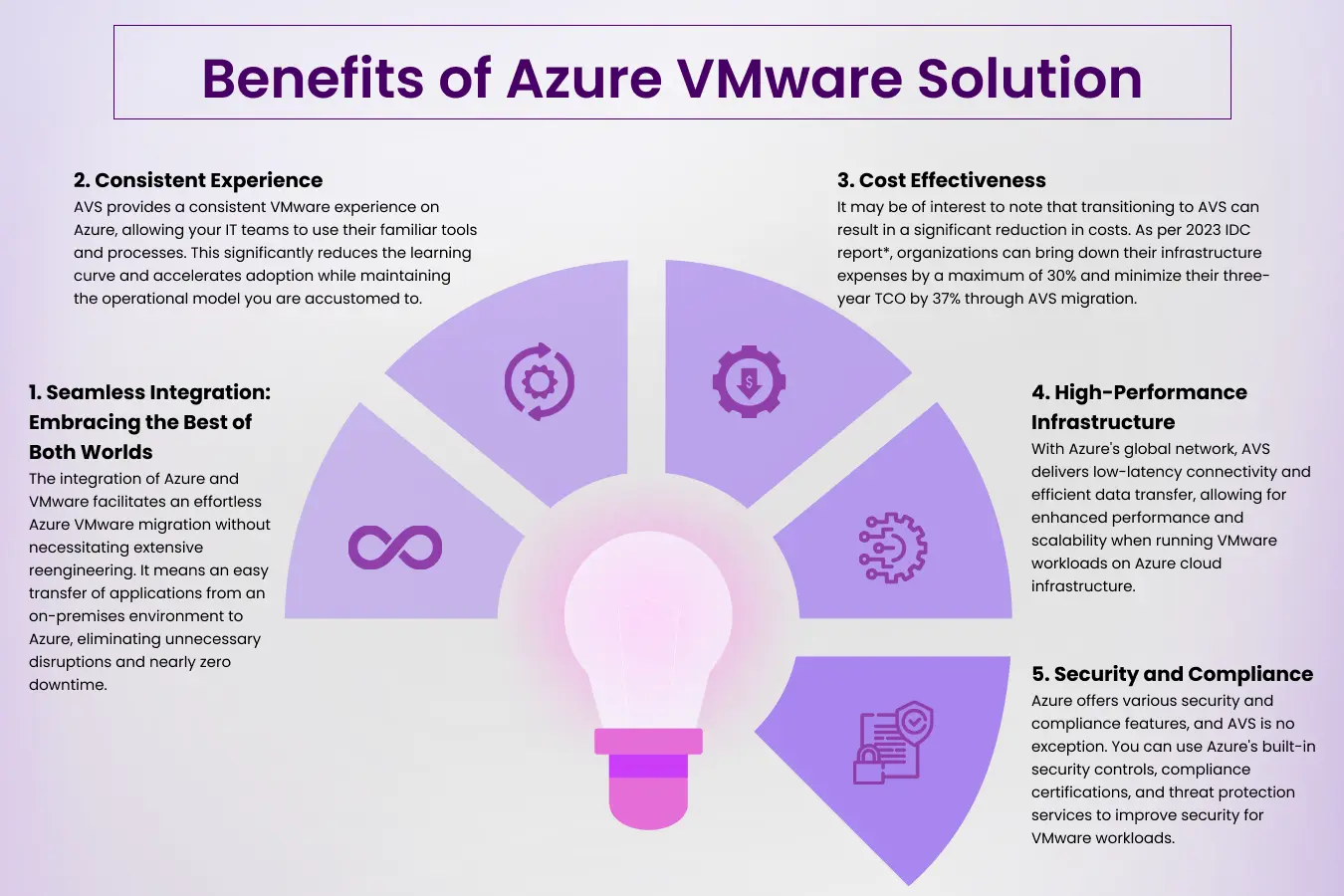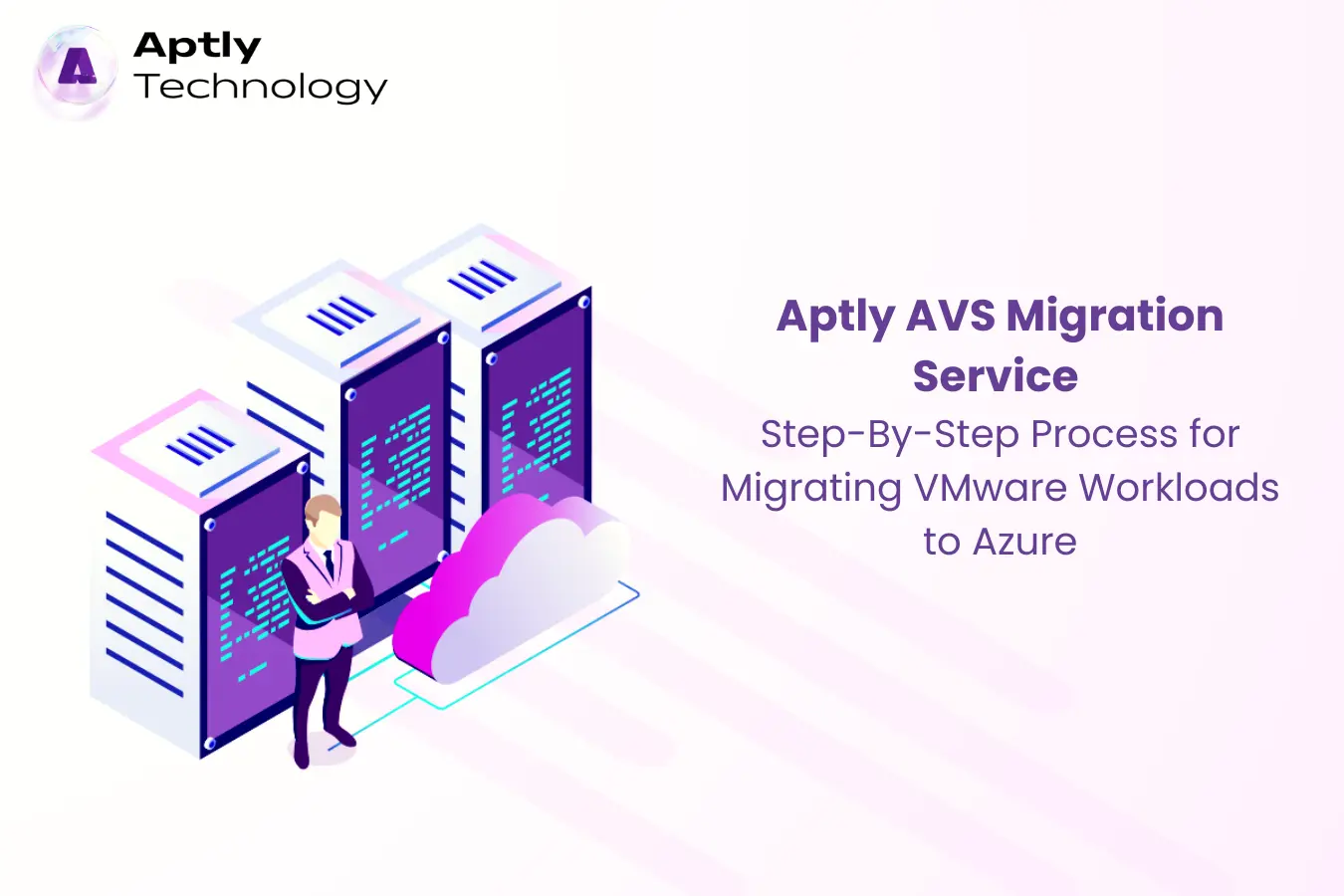
Introduction
Innovation is important to stay ahead of the competition in today’s ever-evolving tech world. This is why organizations are always looking for ways to optimize their IT infrastructure, increase scalability, and streamline operations.
In the midst of this technological revolution, the advent of cloud computing has been a game-changer. It has not only transformed the way businesses operate but also how they interact with their customers and manage their resources. Cloud computing, being a powerful tool in this fast-paced digital world, has enabled businesses to become more agile and efficient.
As we delve deeper into the era of digital transformation, the integration of cloud services with existing IT infrastructure has become a critical factor for businesses. But how to achieve this seamless integration between on-premises and cloud environments? This is where Microsoft’s Azure VMware Solution (AVS) comes into the picture.
Microsoft’s AVS (Azure VMware Solution) is an innovative solution that combines the reliability of VMware with the innovations of Azure, allowing companies to easily extend and integrate their on-premises VMware workloads into Azure cloud infrastructure. AVS is a first-party service developed in collaboration with VMware. It is designed to provide a familiar vSphere-based, private cloud infrastructure on Microsoft Azure.
The Azure VMware Solution enables businesses to efficiently expand, automate, and swiftly deploy their VMware workloads on Azure’s worldwide infrastructure with unparalleled speed. In comparison to on-premises VMware infrastructure, AVS is designed to allow organizations to take full advantage of the cloud without replacing the VMware infrastructure.
Read further to learn more about switching to cloud, AVS, its key features, and the benefits of Azure VMware migration.
Why Switch to Cloud Infrastructure?
Organizations are choosing Cloud infrastructure for simplifying needs related to business, finance, and technology. For instance –
- To reduce the cost of owning and operating data centers
- To integrate with cloud-native services
- For seamless machine learning and AI service integration.
- Shift the financial model to operational expenditure rather than capital expenditures caused due to owning substantial numbers of operating systems and servers.
- Hardware refresh or AMC renewal for Out of warranty hardware.
- VMware upgrade or License Renewal.
- Benefit of On-demand resources addition and removal.
- No re-platform or IP change is required.
So, where does Azure VMware Solution fit in?
Azure VMware Solution (AVS) is a perfect example of a solution that addresses these needs. AVS allows businesses to seamlessly move their on-premises VMware workloads to the Azure Cloud, thereby providing the benefits of on-demand resources and operational expenditure models.
It also enables businesses to integrate with cloud-native services and provides a platform for seamless machine learning and AI service integration. This is why AVS is becoming a popular choice for businesses looking to optimize their IT infrastructure and stay ahead in the digital transformation journey.
Understanding Azure VMware Solution
Azure VMware Solution is a service that migrates your VMware workloads to the cloud. It is a fully managed service providing a consistent and familiar VMware environment, so businesses can leverage the existing tools, processes, and skills while enjoying the unparalleled scalability and reach of Azure.
With Azure VMware solution, businesses can seamlessly migrate, or extend, their on-premises VMware environments to Azure cloud infrastructure. And the best part is, there is no need for significant re-architecting or application refactoring.
Azure VMware Solution Features
As explained earlier, AVS or the Azure VMware Solution is a high-end solution designed to offer a comprehensive, familiar VMware environment on Azure Cloud infrastructure. And migrating vSphere application to Azure means –
- Leveraging the existing VMware investment structure – It means the solution is based on vCenter and vSphere and there is no additional requirement for new tools and skills. Businesses can easily manage their VMware environments on Azure cloud without refactoring the hypervisor.
- Single point support – Azure VMware solution as mentioned above is a solution developed, operated, and supported by Microsoft. And it is the only coordinating support with VMware as needed.
- Operational consistency – The AVS or the Azure VMware solutions enable you to use the same VMware tools in the Azure cloud environment, therefore ensuring maximum operational consistency.
Benefits of Azure VMware Solution

- Seamless Integration: Embracing the Best of Both Worlds: The integration of Azure and VMware facilitates an effortless Azure VMware migration without necessitating extensive reengineering. It means an easy transfer of applications from an on-premises environment to Azure, eliminating unnecessary disruptions and nearly zero downtime.
– Furthermore, applications can be operated uninterruptedly while leveraging Azure’s global network for enhanced performance and reliability. It is akin to upgrading to a faster, more efficient vehicle that retains the familiar feel of driving.
- Consistent Experience: AVS provides a consistent VMware experience on Azure, allowing your IT teams to use their familiar tools and processes. This significantly reduces the learning curve and accelerates adoption while maintaining the operational model you are accustomed to.
– Moreover, AVS is more than just migrating to the cloud. It involves improving the quality of your applications. By leveraging Azure’s services, you can benefit from automation, AI, and machine learning capabilities.
– You can enhance your applications by developing new features, enhancing security, and leveraging advanced analytics to gain deeper insights from your data. In other words, AVS provides an excellent chance to not only move your apps but also to make them better.
- Cost Effectiveness: It may be of interest to note that transitioning to AVS can result in a significant reduction in costs. As highlighted in the IDC study commissioned by VMware, enterprises leveraging Azure VMware Solution have seen remarkable outcomes, including a 357% return on investment over three years, a 37% reduction in the overall cost of operations over the same period, and a payback period of just nine months.
– Our experience with our clientele corroborates these figures. By transitioning away from physical data centers, maintenance, energy, and space expenses are reduced. Furthermore, AVS incorporates host, storage, and networking expenses, providing greater predictability with respect to IT expenditures.
– To top it off, Extended Security Updates are provided free of charge for three years, ensuring the security of your systems without incurring additional expenses.
- High-Performance Infrastructure: With Azure’s global network, AVS delivers low-latency connectivity and efficient data transfer, allowing for enhanced performance and scalability when running VMware workloads on Azure cloud infrastructure.
- Security and Compliance: Azure offers various security and compliance features, and AVS is no exception. You can use Azure’s built-in security controls, compliance certifications, and threat protection services to improve security for VMware workloads.
– You also have various security choices in AVS to safeguard their workloads, such as built-in firewalls, gateway firewalls, and distributed firewalls. These options offer both East-West and North-South firewalling. Additionally, customers can use third-party or next-gen firewalls for extra security, maintaining consistency with on-premises security measures.
- Hybrid Cloud Connectivity: AVS supports seamless connectivity between on-premises environment and Azure, enabling organizations to build hybrid cloud solutions.
- Innovative Services: Organizations can leverage Azure’s extensive range of cloud services, including AI, analytics, IoT, and more, to drive innovation and enhance VMware workloads in AVS.
Migration to Azure VMware Solution with Aptly
Aptly Technology makes your migration from VMware to Azure easy by breaking it down into four straightforward steps:
1. Migration Assessment: In this phase, we design a hybrid cloud model tailored to your needs. We evaluate your current infrastructure and provide a detailed readiness report to prepare you for the migration.
2. Proof of Concept (POC): Here, we integrate your VMware with Azure and plan the deployment. We configure AVS and test the connectivity to ensure everything is set up correctly.
3. Migration Implementation: This is where the actual migration happens. We efficiently move your workloads, set up AVS, configure the connectivity, and perform thorough testing to ensure everything is running smoothly.
4. Post-Migration Support: After the migration, we provide ongoing support, monitor your systems remotely, and conduct performance assessments regularly. This helps ensure the stability of your new setup and helps you get the most out of your investment.
For a detailed guide on each step of the migration process to Azure VMware Solutions, continue reading on our next blog.
Azure VMware Solution Use Cases
- Expanding Data Center Easily:
With AVS, organizations can access flexible payment plans to swiftly increase their data center capacity. This is particularly ideal for meeting fluctuating seasonal, temporary, or regional demands.
- Cloud Disaster Recovery:
AVS allows for the deployment of the VMware stack within Azure. This provides a fully consistent disaster recovery solution for on-premises infrastructure via VMware Site Recovery Manager or compatible solutions.
- Reducing Data Center Footprint:
AVS enables the seamless migration of vSphere-based workloads to Azure. This helps in streamlining on-premises infrastructure while ensuring a non-disruptive, automated, and scalable transition.
- Modernizing Applications:
AVS empowers developers by providing access to Azure’s extensive service ecosystem and the VMware Tanzu platform. This facilitates application modernization without the need for complete rewriting.
- Cloud Desktop Virtualization:
With AVS, organizations can utilize robust infrastructure and rapid networking capabilities to implement virtual desktop infrastructure (VDI). This can be used for bursting on-premises VMware Horizon or safeguarding against potential disasters.
Why Choose Aptly?
Keeping up with changes can be challenging, especially when your IT infrastructure is complex. If you’re a VMware customer, considering AVS could be a strategic move to set your business up for long-term success. Moreover, it is a great opportunity to explore the benefits of adopting AVS, especially given the forthcoming changes for VMware’s clientele.
AVS is not just another tool; it can help your business become more efficient and innovative. It’s a strategic undertaking with the potential to position your business for long-term success. If you’re interested in implementing AVS within your enterprise but are unsure how to proceed, Aptly Tech’s AVS specialist is available to assist.
We are Gold Microsoft Partners, and we bring a wealth of expertise and commitment to excellence.
We have the capability to eliminate complicated application dependency mapping and time-consuming refactoring and re-architecting. A brief consultation with our expert can set you on a path towards an innovative and efficient future. Our AVS Migration service is designed to seamlessly move your vSphere applications to the Microsoft Azure cloud infrastructure with utmost agility, security, and efficiency. Choose Aptly, choose a future of innovation and efficiency. We are here to assist you on this journey.
Conclusion
To sum up, the Azure VMware solution by Microsoft is nothing but a seamless yet cost-effective way to help organizations run their VMware workloads in the Azure cloud infrastructure while enjoying the benefits of high scalability and security.
Migrating vSphere applications to the Azure cloud infrastructure means exposure to underlying architectural differences between enterprise infrastructures and public cloud. Aptly Tech can help organizations with simplified and scalable migration strategies and seamless deployments. The services are here to help organizations accelerate their business goals and outpace the competition with expert cloud innovation services.
Talk to our Azure specialist today and empower your business for a successful tomorrow!




